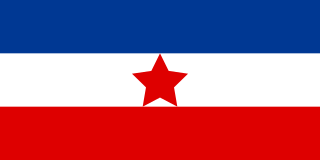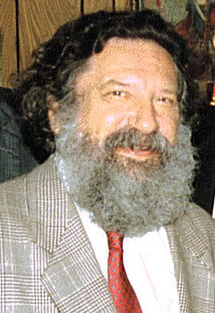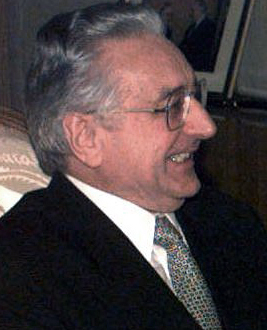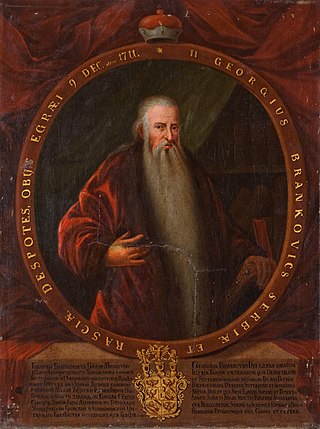
Historical negationism, also called historical denialism, is falsification or distortion of the historical record. It should not be conflated with historical revisionism, a broader term that extends to newly evidenced, fairly reasoned academic reinterpretations of history. In attempting to revise the past, historical negationism acts as illegitimate historical revisionism by using techniques inadmissible in proper historical discourse, such as presenting known forged documents as genuine, inventing ingenious but implausible reasons for distrusting genuine documents, attributing conclusions to books and sources that report the opposite, manipulating statistical series to support the given point of view, and deliberately mistranslating texts.
Only Unity Saves the Serbs is a popular motto and slogan in Serbia and among Serbs, often used as a rallying call during times of national crisis and against foreign domination. The phrase is an interpretation of what is taken to be four Cyrillic letters for "S" on the Serbian cross. Popular mythology attributes the motto to Saint Sava, the founder of the Serbian Orthodox Church, however, the true author is Jovan Dragašević.

The Yugoslav Partisans, or the National Liberation Army, officially the National Liberation Army and Partisan Detachments of Yugoslavia, was the communist-led anti-fascist resistance to the Axis powers in occupied Yugoslavia during World War II. Led by Josip Broz Tito, the Partisans are considered to be Europe's most effective anti-Axis resistance movement during World War II.

Andrija Artuković was a Croatian lawyer, politician, and senior member of the ultranationalist and fascist Ustasha movement, who served as the Minister of Internal Affairs and Minister of Justice in the Government of the Independent State of Croatia (NDH) during World War II in Yugoslavia. He signed into law a number of racial laws against Serbs, Jews, and Roma, and was responsible for a string of concentration camps in which over 100,000 civilians were tortured and murdered. He escaped to the United States after the war, where he lived until extradited to Yugoslavia in 1986. He was tried and found guilty of a number of mass killings in the NDH, and was sentenced to death, but the sentence was not carried out due to his age and health. He died in custody in 1988.

Jovan Rašković was a Croatian Serb psychiatrist, academic and politician.

Srđa Trifković is a Serbian-American publicist, politician and historian. He is currently a foreign affairs editor for the paleoconservative magazine Chronicles, and a politics professor at the University of Banja Luka in Bosnia and Herzegovina.

The Crveni Krst concentration camp, also known as the Niš concentration camp, located in Crveni Krst, Niš, was operated by the German Gestapo and used to hold captured Serbs, Jews and Romanis during the Second World War. Established in mid-1941, it was used to detain as many as 35,000 people during the war and was liberated by the Yugoslav Partisans in 1944. More than 10,000 people are thought to have been killed at the camp. After the war, a memorial to the victims of the camp was erected on Mount Bubanj, where many inmates were shot. A memorial museum was opened on the former campgrounds in 1967 and in 1979 the campgrounds were declared a Cultural Monument of Exceptional Importance and came under the protection of the Socialist Republic of Serbia.

The history of the Jews in Serbia is some two thousand years old. The Jews first arrived in the region during Roman times. The Jewish communities of the Balkans remained small until the late 15th century, when Jews fleeing the Spanish and Portuguese Inquisitions found refuge in the Ottoman-ruled areas, including Serbia.

The Genocide of Serbs in the Independent State of Croatia was the systematic persecution of Serbs which was committed during World War II by the fascist Ustaše regime in the Nazi German puppet state known as the Independent State of Croatia between 1941 and 1945. It was carried out through executions in death camps, as well as through mass murder, ethnic cleansing, deportations, forced conversions, and war rape. This genocide was simultaneously carried out with the Holocaust in the NDH as well as the genocide of Roma, by combining Nazi racial policies with the ultimate goal of creating an ethnically pure Greater Croatia.

Anti-Serb sentiment or Serbophobia is a generally negative view of Serbs as an ethnic group. Historically it has been a basis for the persecution of ethnic Serbs.
During the Yugoslav Wars (1991–2001), propaganda was widely used in the media of the Federal Republic of Yugoslavia, of Croatia and of Bosnia.

The Holocaust in the Independent State of Croatia involved the genocide of Jews, Serbs and Romani within the Independent State of Croatia, a fascist puppet state that existed during World War II, led by the Ustaše regime, which ruled an occupied area of Yugoslavia including most of the territory of modern-day Croatia, the whole of modern-day Bosnia and Herzegovina and the eastern part of Syrmia (Serbia). Of the 39,000 Jews who lived in the NDH in 1941, the United States Holocaust Memorial Museum states that more than 30,000 were murdered. Of these, 6,200 were shipped to Nazi Germany and the rest of them were murdered in the NDH, the vast majority in Ustaše-run concentration camps, such as Jasenovac. The Ustaše were the only quisling forces in Europe who operated their own extermination camps for the purpose of murdering Jews and members of other ethnic groups.

The Holocaust in German-occupied Serbia was part of the European-wide Holocaust, the Nazi genocide against Jews during World War II, which occurred in the Territory of the Military Commander in Serbia, the military administration of the Third Reich established after the April 1941 invasion of Yugoslavia. The crimes were primarily committed by the German occupation authorities who implemented Nazi racial policies, assisted by the collaborationist forces of the successive puppet governments established by the Germans in the occupied territory.
The Government of National Salvation, also referred to as Nedić's government and Nedić's regime, was the colloquial name of the second Serbian collaborationist puppet government established in the German-occupied territory of Serbia during World War II in Yugoslavia. Appointed by the German Military Commander in Serbia, it operated from 29 August 1941 to 4 October 1944. Unlike the Independent State of Croatia, the regime in occupied Serbia was never accorded status in international law and did not enjoy formal diplomatic recognition of the Axis powers.
Lazar "Lazo" M. Kostić was a Montenegrin Serb nationalist writer, economist, statistician and doctor of law.

Tuđmanism or Tudjmanism is a form of Croatian nationalism which reached its strongest peak during the administration of Croatia's first president, Franjo Tuđman. Tuđman himself defined the ideology as non-communist nationalism with "re-examined Croatian history".
Garavice was an extermination location established by the Independent State of Croatia (NDH) during World War II in Yugoslavia near Bihać, west Bosnia. Between 7,000 and 12,000 people, mostly Serb civilians, were murdered at Garavice by the Ustasha regime in 1941.

Milorad Ekmečić was a Yugoslav and Serbian historian. During World War II he became a member of the Yugoslav Partisans after the fascist Ustaše perpetrated the Prebilovci massacre, in which 78 members of his family were killed, including his father. He studied at the University of Zagreb and went on to be a professor at the University of Sarajevo, and later at the University of Belgrade. He was a member of several Yugoslav academies of sciences and arts, the author of more than a dozen historical books, and received several significant national awards. Ekmečić authored several important works in socialist Yugoslavia, including his contribution to the acclaimed History of Yugoslavia published in English in 1974, and Stvaranje Jugoslavije 1790–1918 [Creation of Yugoslavia 1790–1918] in 1989. According to his obituary in Vreme news magazine, Ekmečić was considered "a prominent representative of Serbian critical historiography".
Philip J. Cohen is a former United Nations advisor on Bosnia and Herzegovina who has written several works on the history of the former Yugoslavia. He authored a noted book Serbia’s Secret War: Propaganda and the Deceit of History, first published in 1996 by Texas A&M University Press to mixed reviews. He followed this in 1997 with the publishing of The World War II and contemporary Chetniks: Their historico-political continuity and implications for stability in the Balkans by Ceres. In 1998, he received an award from Franjo Tuđman the President of Croatia for his "contribution in spreading the truth about the aggression against Croatia" and "exposing Great Serb and anti-Croat propaganda" through his books.

Serbian historiography refers to the historiography of the Serb people since the founding of Serbian statehood. The development can be divided into four main stages: traditional historiography, Ruvarac's critical school, Communist–Marxist legacy, and the renewed Serbian national movement.











